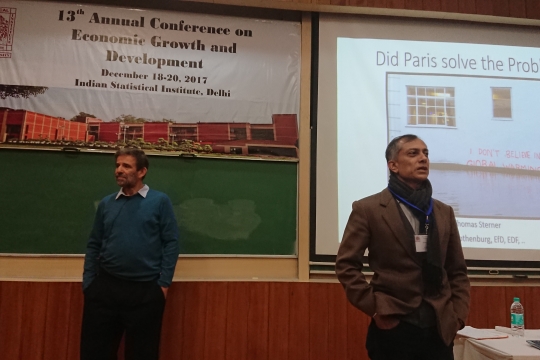The Indian Statistical Institute held its Annual Conference on Economic Growth and Development, Dec 18-20 in Delhi.
Environmental themes where well represented in the program and Thomas Sterner, University of Gothenburg, gave a keynote on climate economics. Sterner started by connecting to the world sketched in Stiglitz speech where income grows exponentially but the share given to labor falls. At best, employment and wages are fairly constant and this is related to the notion of Universal Basic Income. The most important part of GDP goes to those who control innovation, industry and “land” rents – often referred to as the “1%”. Sterner emphasized that although capital becomes cheaper and cheaper as it is produced just by capital and technology (with little need for labor) there are still scarce resources. Indeed there are many as shown by the debate on planetary boundaries.
The rapid price fall of renewable energy is a glimmer of hope
There is an increasing over utilization of public environmental resources and the planet will face existential crises if we let economic activities increase exponentially. Sterner made the climate crisis his main example, and showed that the most obvious economic instrument would involve setting a price on carbon – but this has proven almost hopelessly difficult. The best the world has produced so far is the Paris agreement which is little more than an expression of good will. The only glimmer of hope provided by Professor Sterner was the rapid decline in prices of renewable energy. Combined with green finance and a strong commitment by countries and communities we can start our attempts to avoid some of the planetary boundaries.
See link to the full conference program with video links here
See link to Sterner´s keynote presentation here
The ISI 13th Annual Conference on Economic Growth and Development gathered some 150 international researchers from all over the World. Main themes related to development, growth and environment with many additional subjects such as gender, urban development, trade, political economy, health and education. There were four plenaries. Joseph Stiglitz spoke on technological change and income distribution, Avinash Dixit spoke on corruption and anticorruption institutions. On the second day Kaivan Munshi spoke on Wealth, Marriage and sex selection.
